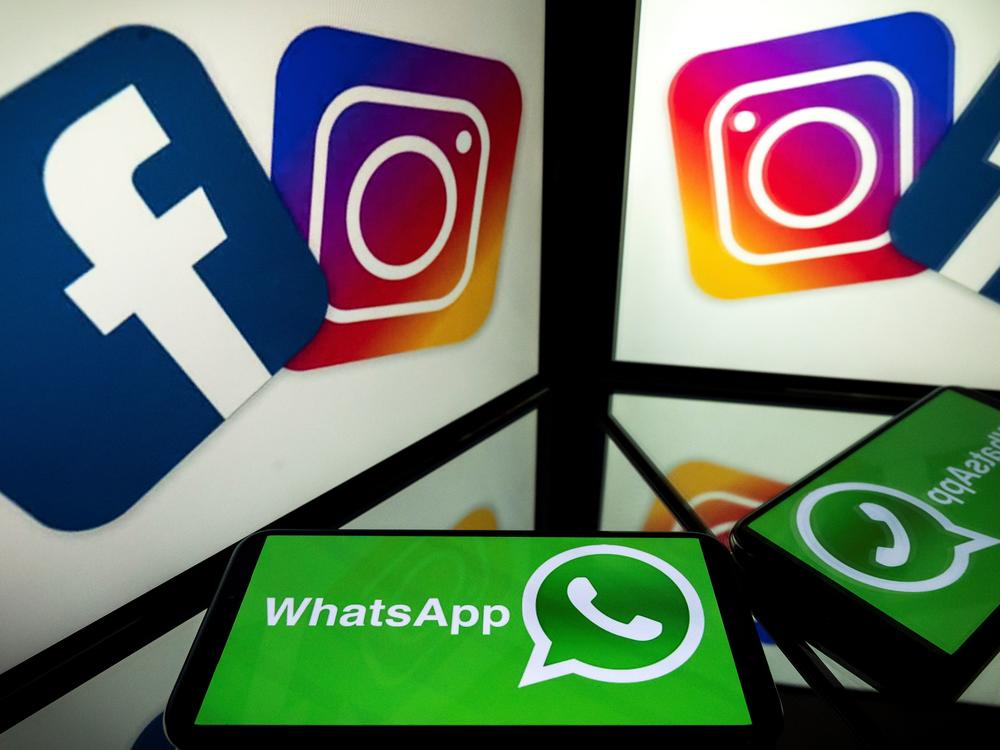Section Branding
Header Content
Federal Trade Commission Refiles Suit Accusing Facebook Of Illegal Monopoly
Primary Content
Updated August 19, 2021 at 12:54 PM ET
The Federal Trade Commission is taking another swing at Facebook after a judge tossed out its initial effort in June, with a new complaint accusing the social media giant of illegally maintaining a monopoly by squelching competitors.
The social network "resorted to an illegal buy-or-bury scheme to maintain its dominance," the regulator said in a news release Thursday about its new filing.
It accused Facebook of buying up-and-coming rivals Instagram and WhatsApp to protect its dominance and of luring other would-be competitors with access to its platform and data and then cutting them off when they became threats.
"After failing to compete with new innovators, Facebook illegally bought or buried them when their popularity became an existential threat," Holly Vedova, acting director of the FTC's Bureau of Competition, said in a statement.
Facebook has until Oct. 4 to respond in court. On Thursday, the company blasted the FTC's lawsuit as "meritless," noting that its purchases of Instagram and WhatsApp had been "reviewed and cleared" by regulators "many years ago."
"The FTC's claims are an effort to rewrite antitrust laws and upend settled expectations of merger review, declaring to the business community that no sale is ever final," Facebook said on Twitter. "We fight to win people's time and attention every day, and we will continue vigorously defending our company."
The FTC first sued Facebook in December in tandem with a separate lawsuit from 48 attorneys general making similar allegations that Facebook crushed competition.
But Judge James Boasberg of the U.S. District Court for the District of Columbia dismissed the FTC's complaint in June. Boasberg said the agency failed to give enough evidence for its argument that the company holds a monopoly in social networking. But he also gave the FTC 30 days to refile the suit, a deadline that the court later agreed to extend to Aug. 19.
The judge also dismissed the states' case against Facebook, saying they had waited too long to challenge the purchases of Instagram in 2012 and WhatsApp in 2014. The states said they plan to appeal the ruling.
The FTC's new complaint is nearly 30 pages longer than the original. It makes similar arguments about Facebook's alleged anti-competitive strategy of buying up or blocking companies it perceived as potential threats, but it also gives more backing for its claim that the social network is a monopolist in an attempt to address the judge's concerns.
Facebook "has been the dominant and largest personal social networking service in the United States since at least 2011," the complaint alleged. It cited data about how many people in the U.S. use Facebook and Instagram each month and how much time they spend on the apps.
The exact figures were redacted from the filing, but the FTC quoted figures from Comscore showing that since 2012, Facebook's share of time spent by U.S. users of social networking apps has exceeded 80% and its share of monthly users has been over 65%.
"No other personal social networking provider in the United States remotely approaches Facebook's scale," the suit said. Snapchat is the next closest, it argued, "but its user base pales in comparison," with tens of millions of fewer users a month than either Facebook or Instagram.
The agency pushed back against Facebook's claims that it faces plenty of competition, saying specialized social networks such as LinkedIn, messaging services including Signal and Apple's iMessage, and other apps including TikTok, YouTube and Twitter are not in the same category of providing "personal social networking."
The FTC said Facebook's market power is also evident in the fact that even when the company has gone through crises — such as the Cambridge Analytica scandal in which user data was harvested without people's consent — "Facebook does not lose significant users or engagement to competitors."
Facebook's outsize profits and trillion-dollar market cap are also evidence of its entrenched position, the complaint alleged.
The revived lawsuit opens the next chapter in Washington's battle with Big Tech, which kicked off under former President Donald Trump and has accelerated during the Biden administration.
The FTC's new chair, Lina Khan, is one of the most prominent voices calling for curbs on the dominance of big companies, especially the Silicon Valley giants that have gained so much power in recent years.
In Khan's early weeks in the job, she has signaled a more aggressive approach toward potentially anti-competitive behavior — and has drawn criticism from the companies she's tasked with regulating. Both Facebook and Amazon have petitioned the FTC for Khan to recuse herself from cases involving the companies, citing her previous criticism of them.
On Thursday, the FTC said it had "carefully reviewed" Facebook's recusal petition and dismissed it. "As the case will be prosecuted before a federal judge, the appropriate constitutional due process protections will be provided to the company," the agency said.
The five FTC commissioners voted 3-2 along party lines to bring the complaint against Facebook, with Khan joining the two other Democrats in support.
Editor's note: Facebook is among NPR's financial supporters.
Copyright 2021 NPR. To see more, visit https://www.npr.org.

